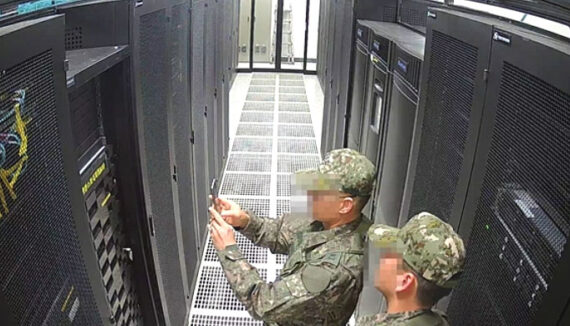by WorldTribune Staff, July 16, 2025 Real World News
When then-President Yoon Suk-Yeol briefly declared martial law on Dec. 3, 2024, it seemed to come out of nowhere and took many by complete surprise.
Except, that is, to “those who have been following what’s happening to the Korean electoral system,” an analysis said.

“As a result of years of unusual election results and a lack of transparency about the mechanics of the electoral system” in South Korea “there has been persistent degradation of trust in free and fair elections in the country,” Grant Newsham wrote in an analysis posted to LinkedIn. [See: (PDF) Newsham Briefing Paper South Korea Electoral Fraud].
“Those trying to investigate are targeted. The judiciary won’t preside over cases. Governance has become difficult,” Newsham added. “The result is a country on the edge, with malign actors gaining influence — including North Korea (DPRK) and the People’s Republic of China (PRC). What’s going on in Korea can happen in any democratic country where elections are not secure.”
Newsham was the first U.S. Marine Liaison Officer to the Japan Ground Self-Defense Force. He is a former U.S. Foreign Service Officer for East Asia specializing in insurgency, counter-insurgency, and commercial matters. He is a Senior Research Fellow for the Japan Forum for Strategic Studies.
“Since 2020 I’ve been researching election irregularities in South Korea. When I started I didn’t expect to find anything of note,” Newsham wrote.
After in-depth research and first-person interviews with South Korean election fraud experts, what Newsham found “were genuine grounds for concern” in the South’s election system. Those concerns include:
• The declaration of martial law by President Yoon was a response to ongoing allegations of election fraud and political turmoil, highlighting the erosion of democracy in South Korea. Since 2017, the Moon Jae-in administration and the Democratic Party have consolidated control over the national assembly, judiciary, media, labor unions, military and importantly, the National Election Commission to establish long-term control over the levers of power in South Korea.
• The 2020 and 2024 general elections and the 2022 presidential election were marred by allegations of widespread and substantive electoral fraud.
• There are concerns over potential interference by China and North Korea, drawing the attention of U.S. intelligence agencies and raising this issue to an international level.
Newsham concluded that “urgent electoral reforms are needed, including reforming the National Election Commission, minimizing electronic voting and cyber vulnerabilities, ensuring transparent ballot counting procedures, curtailing the ‘early voting’ system, ensuring fraud allegations are freely raised and resolved. All in all, greater transparency and confidence in the ROK electoral process is required.”
Meanwhile, South Korea’s new leftist president, Lee Jae-Myung is pressing full steam ahead in his quest for “vengeance” against Yoon “while longing for reconciliation with North Korea,” columnist Donald Kirk wrote for The New York Sun on July 14.
“Mired in corruption scandals dating from his years as a provincial governor and city mayor, Lee and his leftist allies are counting on a court to find the conservative Yoon guilty of insurrection for his abortive attempt at imposing martial law in December. They have expanded the case against Yoon after persuading the court to jail him a second time after a four-month respite,” Kirk noted.
Leftist investigators and prosecutors are demanding Yoon again submit to questioning despite his repeated refusal to respond.
“The betting is that the court will impose a lengthy prison term on Yoon regardless of what he says at a trial that could simmer on for months if not years while prosecutors also turn against his leading confederates, notably his former defense minister, also in jail,” Kirk wrote. “The defense minister and top military and police officers are accused of having convinced Yoon of the need for declaring martial law as the way to destroy Lee and his Minju, or Democratic Party, which controls the National Assembly.”
Yoon had gained widespread support for tightening bonds with Tokyo and Washington.
Korean American professor Morse Tan, who served as ambassador at large at the Department of State during the first Trump presidency, is looking into claims that “fraud” helped loft Lee to the presidency in the “snap election” last month after Yoon’s ouster.
Tan is meeting with Korean conservatives, who claim that authorities are repressing any investigation into the results of the election in which Lee easily defeated his conservative opponent.
“Tan, along with many other conservative critics, believes that China played an active role in influencing voters to oppose conservatives while actually rigging the balloting,” Kirk noted.
A sign of the “shifting outlook toward North Korea,” Kirk continued, “is the government’s desire to describe North Korea not as the South’s ‘main enemy’ but simply as a ‘threat.’ The incoming unification minister, Chung Dong-Young, said at an assembly hearing he did not agree when asked if North Korea was an ‘enemy,’ ” Kirk noted.
South Korean patriots want the CCP out of Korea & want even closer ties to the US, but will the politicians, KCTU labor union & the legacy media listen? 종중으로 한국경제가 죽느냐 아님 중국빼고 친미로 경제가 번창하느냐? 민노총 회원들, 특히 조선사업과 관련업체들–선택이 뭡니까? https://t.co/NKacsemUKd
— Tara O (@DrTaraO) July 14, 2025
